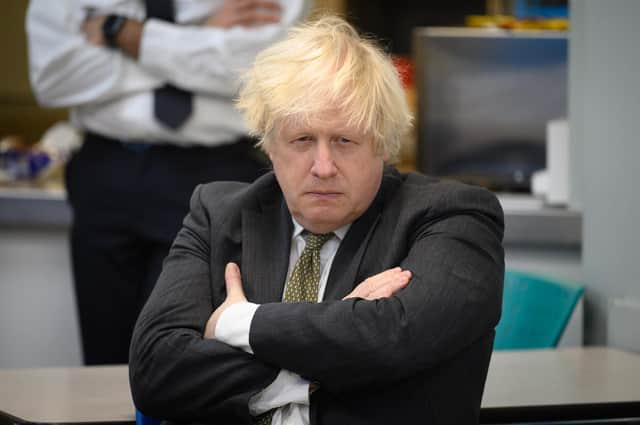Without Frost is there any point to Johnson as PM? Brian Monteith


Now, in the modern world, life is so fast the No.26 comes every five minutes. Maybe it is just a symptom of my ageing, but today’s politics likewise appears far faster and more chaotic, making control from the centre far harder and more challenging. No sooner has one crisis run over the Prime Minister when there’s another accelerating down the road threatening to flatten his curves and take him to Hades, rather than Elysium.
A week ago, all the talk was of Christmas parties (real or imagined) from last year, Omicron cases rising and threatening Christmas plans, and the continuing drift of Conservative policy on the Northern Ireland Protocol, tax rises, and an inability to protect our borders from people traffickers. Then more buses came. There was the large backbench rebellion and next, losing the North Shropshire by-election. Badly.
Advertisement
Hide AdAdvertisement
Hide AdNow Lord Frost has been outed as having intimated his resignation as Brexit Secretary last week – with the intention of going in the New Year. Made real as a result, Johnson faces the gravest calamity of his premiership. Conservative supporters are asking each other a very simple question, “what is Boris Johnson for”? Was it not to get Brexit done so we could move on to deliver Tory policies?
Cast your mind back to 2016 with Boris Johnson seen as the main progenitor of a Brexit referendum victory (it’s far more complex than that but let’s accept had Boris campaigned for Remain the outcome would have been far different).
With Cameron having resigned, so long as Johnson could attract enough support from the sometimes Vipers’ nest of Tory colleagues, he could progress to the run-off vote among party members for the leadership and become Prime Minister. Then Michael Gove decided to stand himself and, believing his path was now blocked by that betrayal, Johnson withdrew. Gove then imploded and Leadsom left the field.
The premiership thus fell to Theresa May, who invited Johnson to become Foreign Secretary, but this was more to bind the party while keeping him close (and possibly setting him up for a fall). By July 2018 when May’s fateful Chequers ambush came, Brexit Secretary David Davis resigned, Johnson was isolated again, and he resigned too.
Tory MPs and the party eventually turned to Boris because he could “get Brexit done” and save the party from defeat. It ended up a stunning victory.
Last week’s North Shropshire by-election result was an unforced error. Had the Prime Minister not attempted to defend Owen Paterson from censure then the MP would have had to take his suspension and risk a reclaim petition.
I have no doubt the public has little time for the focus of broadcasters or tabloids considering who paid for what wallpaper in Downing Street’s living accommodation; nor do people wish to salivate over the latest episode of Westminster Wives to learn of Carrie’s couture, latest pregnancy or environmental infatuations. I wager people are far more concerned knowing when the country can open-up, when face-to-face GP appointments might become common again, when cancer diagnosis and treatment will be regular.
People want to get on with their lives without being mere data to be collected, analysed, nudged, or directed – and a sizeable minority will resist being forced to take a vaccine they are unsure about despite facing the sack, even if they are “key workers”. They want their lives, jobs, incomes and relationships back, and the soap opera that is Boris Johnson’s personal relationships, Peppa Pig gaffes and guest appearances as a virtual quizmaster really do not matter to them if normality can be delivered.
Advertisement
Hide AdAdvertisement
Hide AdAnother sizeable minority are those who voted Conservative in 2019 expecting a Conservative government to behave, well, like Conservatives. Instead, Johnson’s green agenda has blossomed to the point where their energy bills are heating up and their gas boilers may yet be departing; the tax take is rising to record levels, inflation is running away and Plan B puts the economic recovery back in doubt
North Shropshire demonstrated Johnson is losing his core vote, with most conservatives staying at home and many others lending their votes to other parties in temporary protest.
One reason many people were still supporting Johnson was Lord Frost – Johnson’s Brexit backbone, his bad cop to his good cop in negotiations, Frost offered hope a successful Brexit would be realised. There was a real fear removing Johnson could mean his replacement might want an easier life with Frost becoming a victim of a reshuffle and Brexit diluted to the point of it becoming meaningless.
Yet after a fleet of No.26 buses menacing the Prime Minister Lord Frost has himself had enough. The direction Johnson is travelling on restricting our liberties, on raising our taxes and dispensing environmental enemas has caused Frost to jump on his own bus, take the wheel, and drive off to the depot. And who can blame him?
If Boris Johnson is to recover and be a successful Prime Minister the appointment of Liz Truss must do more than simply buy him time, it must mean the NI Protocol is resolved to the satisfaction of the Ulster Unionist parties – and he must resist any post-Christmas lockdown when the science is pointing to it being more infectious but far milder than previous variants.
If he doesn’t do either expect the next bus to have Johnson’s name on it.
Brian Monteith is a director of Global Britain and a former member of the Scottish and European Parliaments.
Comments
Want to join the conversation? Please or to comment on this article.